University Essay: Jacob Glatstein's Yiddish Poetry Analysis
VerifiedAdded on 2022/08/17
|9
|2686
|23
Essay
AI Summary
This essay offers a comprehensive analysis of Jacob Glatstein's Yiddish poetry, focusing on his unique voice and the thematic concerns in his work. The essay begins with an introduction to Glatstein's significance and the imperative nature of his poetic voice, highlighting his role as a poet-prophet. The discussion delves into Glatstein's stance on Yiddish literature, his introspective style, and his response to the Holocaust. It also examines the paradox of his self-worth and his sense of audience. The essay then proceeds to analyze specific poems, including "Good Night, World," "God is a Sad Maharal," "I Have Never Been Here Before," and "Cloud-Jew," interpreting their themes of cultural identity, loss, and the impact of the Holocaust. Through this analysis, the essay illustrates Glatstein's literary techniques, his rejection of traditional poetic forms, and his exploration of the complexities of the Jewish experience in the modern world.
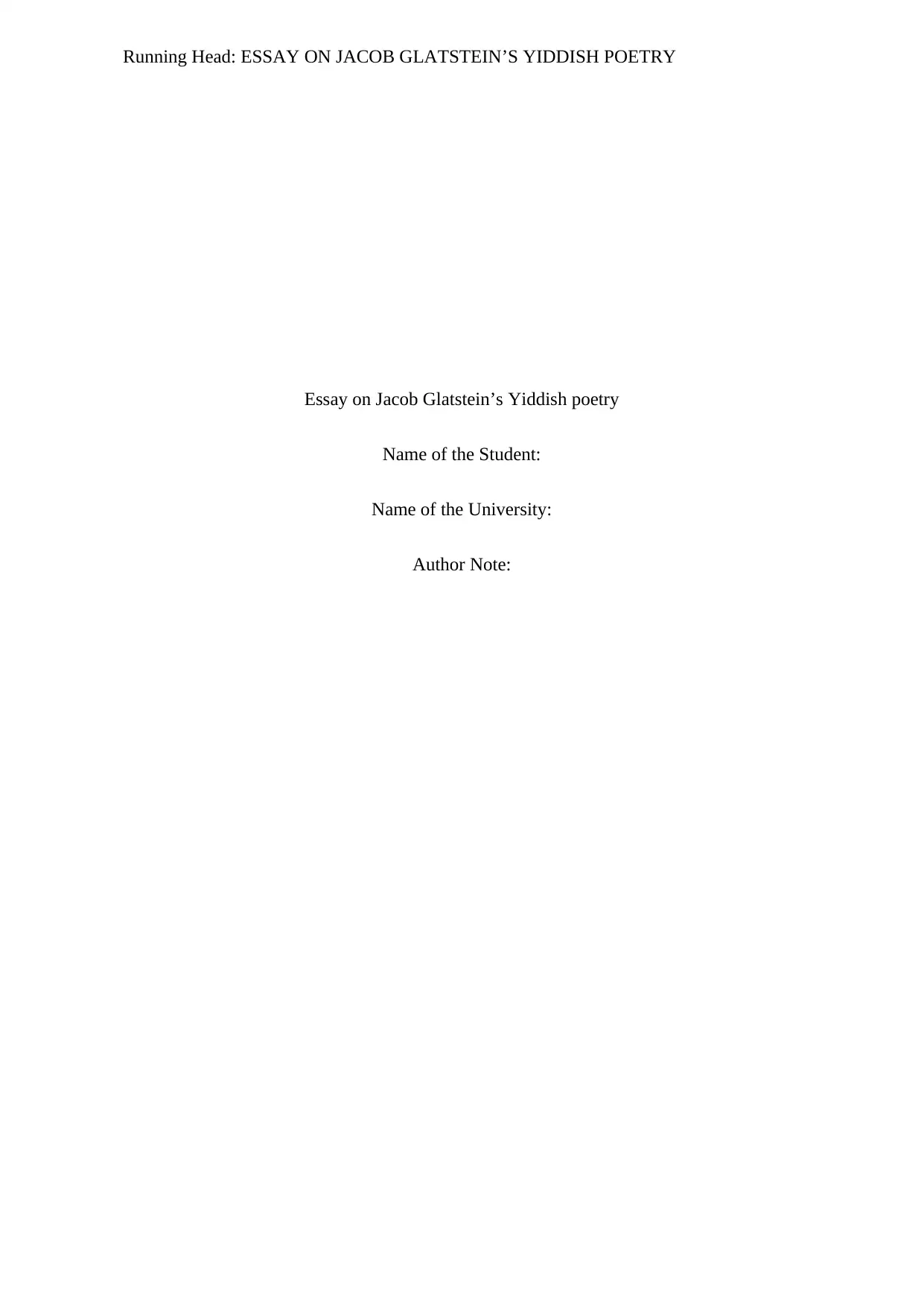
Running Head: ESSAY ON JACOB GLATSTEIN’S YIDDISH POETRY
Essay on Jacob Glatstein’s Yiddish poetry
Name of the Student:
Name of the University:
Author Note:
Essay on Jacob Glatstein’s Yiddish poetry
Name of the Student:
Name of the University:
Author Note:
Paraphrase This Document
Need a fresh take? Get an instant paraphrase of this document with our AI Paraphraser
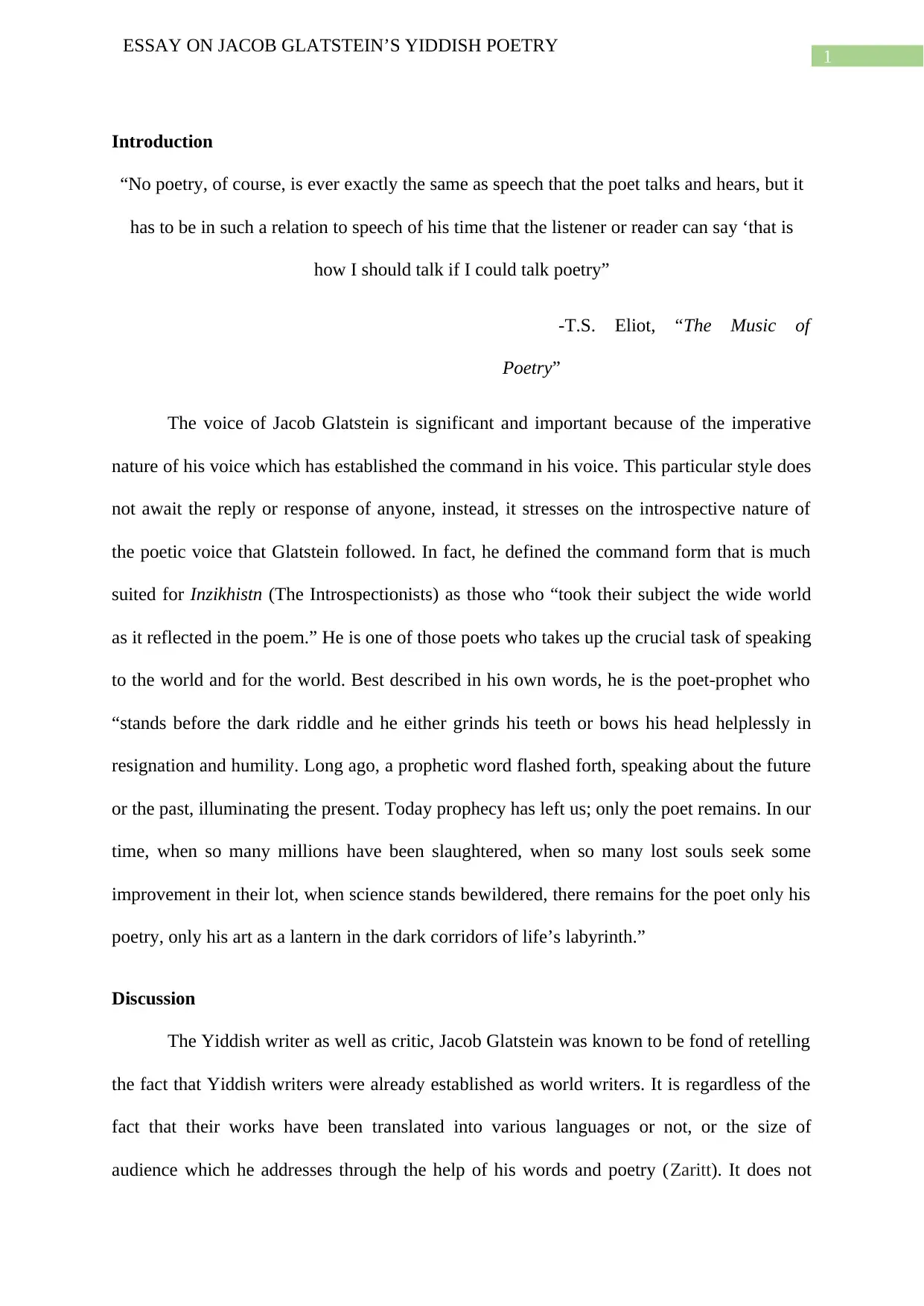
1
ESSAY ON JACOB GLATSTEIN’S YIDDISH POETRY
Introduction
“No poetry, of course, is ever exactly the same as speech that the poet talks and hears, but it
has to be in such a relation to speech of his time that the listener or reader can say ‘that is
how I should talk if I could talk poetry”
-T.S. Eliot, “The Music of
Poetry”
The voice of Jacob Glatstein is significant and important because of the imperative
nature of his voice which has established the command in his voice. This particular style does
not await the reply or response of anyone, instead, it stresses on the introspective nature of
the poetic voice that Glatstein followed. In fact, he defined the command form that is much
suited for Inzikhistn (The Introspectionists) as those who “took their subject the wide world
as it reflected in the poem.” He is one of those poets who takes up the crucial task of speaking
to the world and for the world. Best described in his own words, he is the poet-prophet who
“stands before the dark riddle and he either grinds his teeth or bows his head helplessly in
resignation and humility. Long ago, a prophetic word flashed forth, speaking about the future
or the past, illuminating the present. Today prophecy has left us; only the poet remains. In our
time, when so many millions have been slaughtered, when so many lost souls seek some
improvement in their lot, when science stands bewildered, there remains for the poet only his
poetry, only his art as a lantern in the dark corridors of life’s labyrinth.”
Discussion
The Yiddish writer as well as critic, Jacob Glatstein was known to be fond of retelling
the fact that Yiddish writers were already established as world writers. It is regardless of the
fact that their works have been translated into various languages or not, or the size of
audience which he addresses through the help of his words and poetry (Zaritt). It does not
ESSAY ON JACOB GLATSTEIN’S YIDDISH POETRY
Introduction
“No poetry, of course, is ever exactly the same as speech that the poet talks and hears, but it
has to be in such a relation to speech of his time that the listener or reader can say ‘that is
how I should talk if I could talk poetry”
-T.S. Eliot, “The Music of
Poetry”
The voice of Jacob Glatstein is significant and important because of the imperative
nature of his voice which has established the command in his voice. This particular style does
not await the reply or response of anyone, instead, it stresses on the introspective nature of
the poetic voice that Glatstein followed. In fact, he defined the command form that is much
suited for Inzikhistn (The Introspectionists) as those who “took their subject the wide world
as it reflected in the poem.” He is one of those poets who takes up the crucial task of speaking
to the world and for the world. Best described in his own words, he is the poet-prophet who
“stands before the dark riddle and he either grinds his teeth or bows his head helplessly in
resignation and humility. Long ago, a prophetic word flashed forth, speaking about the future
or the past, illuminating the present. Today prophecy has left us; only the poet remains. In our
time, when so many millions have been slaughtered, when so many lost souls seek some
improvement in their lot, when science stands bewildered, there remains for the poet only his
poetry, only his art as a lantern in the dark corridors of life’s labyrinth.”
Discussion
The Yiddish writer as well as critic, Jacob Glatstein was known to be fond of retelling
the fact that Yiddish writers were already established as world writers. It is regardless of the
fact that their works have been translated into various languages or not, or the size of
audience which he addresses through the help of his words and poetry (Zaritt). It does not
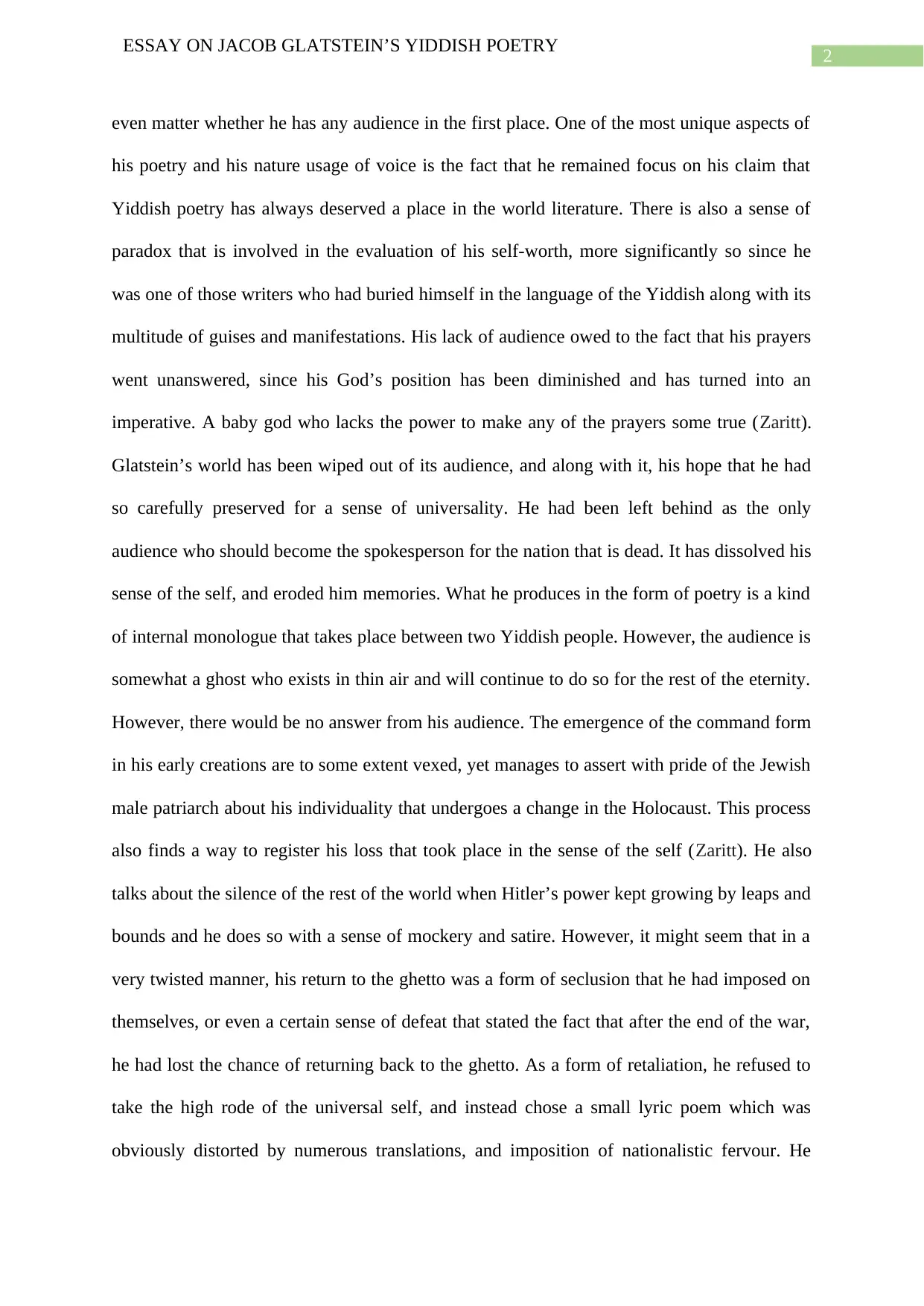
2
ESSAY ON JACOB GLATSTEIN’S YIDDISH POETRY
even matter whether he has any audience in the first place. One of the most unique aspects of
his poetry and his nature usage of voice is the fact that he remained focus on his claim that
Yiddish poetry has always deserved a place in the world literature. There is also a sense of
paradox that is involved in the evaluation of his self-worth, more significantly so since he
was one of those writers who had buried himself in the language of the Yiddish along with its
multitude of guises and manifestations. His lack of audience owed to the fact that his prayers
went unanswered, since his God’s position has been diminished and has turned into an
imperative. A baby god who lacks the power to make any of the prayers some true (Zaritt).
Glatstein’s world has been wiped out of its audience, and along with it, his hope that he had
so carefully preserved for a sense of universality. He had been left behind as the only
audience who should become the spokesperson for the nation that is dead. It has dissolved his
sense of the self, and eroded him memories. What he produces in the form of poetry is a kind
of internal monologue that takes place between two Yiddish people. However, the audience is
somewhat a ghost who exists in thin air and will continue to do so for the rest of the eternity.
However, there would be no answer from his audience. The emergence of the command form
in his early creations are to some extent vexed, yet manages to assert with pride of the Jewish
male patriarch about his individuality that undergoes a change in the Holocaust. This process
also finds a way to register his loss that took place in the sense of the self (Zaritt). He also
talks about the silence of the rest of the world when Hitler’s power kept growing by leaps and
bounds and he does so with a sense of mockery and satire. However, it might seem that in a
very twisted manner, his return to the ghetto was a form of seclusion that he had imposed on
themselves, or even a certain sense of defeat that stated the fact that after the end of the war,
he had lost the chance of returning back to the ghetto. As a form of retaliation, he refused to
take the high rode of the universal self, and instead chose a small lyric poem which was
obviously distorted by numerous translations, and imposition of nationalistic fervour. He
ESSAY ON JACOB GLATSTEIN’S YIDDISH POETRY
even matter whether he has any audience in the first place. One of the most unique aspects of
his poetry and his nature usage of voice is the fact that he remained focus on his claim that
Yiddish poetry has always deserved a place in the world literature. There is also a sense of
paradox that is involved in the evaluation of his self-worth, more significantly so since he
was one of those writers who had buried himself in the language of the Yiddish along with its
multitude of guises and manifestations. His lack of audience owed to the fact that his prayers
went unanswered, since his God’s position has been diminished and has turned into an
imperative. A baby god who lacks the power to make any of the prayers some true (Zaritt).
Glatstein’s world has been wiped out of its audience, and along with it, his hope that he had
so carefully preserved for a sense of universality. He had been left behind as the only
audience who should become the spokesperson for the nation that is dead. It has dissolved his
sense of the self, and eroded him memories. What he produces in the form of poetry is a kind
of internal monologue that takes place between two Yiddish people. However, the audience is
somewhat a ghost who exists in thin air and will continue to do so for the rest of the eternity.
However, there would be no answer from his audience. The emergence of the command form
in his early creations are to some extent vexed, yet manages to assert with pride of the Jewish
male patriarch about his individuality that undergoes a change in the Holocaust. This process
also finds a way to register his loss that took place in the sense of the self (Zaritt). He also
talks about the silence of the rest of the world when Hitler’s power kept growing by leaps and
bounds and he does so with a sense of mockery and satire. However, it might seem that in a
very twisted manner, his return to the ghetto was a form of seclusion that he had imposed on
themselves, or even a certain sense of defeat that stated the fact that after the end of the war,
he had lost the chance of returning back to the ghetto. As a form of retaliation, he refused to
take the high rode of the universal self, and instead chose a small lyric poem which was
obviously distorted by numerous translations, and imposition of nationalistic fervour. He
⊘ This is a preview!⊘
Do you want full access?
Subscribe today to unlock all pages.

Trusted by 1+ million students worldwide
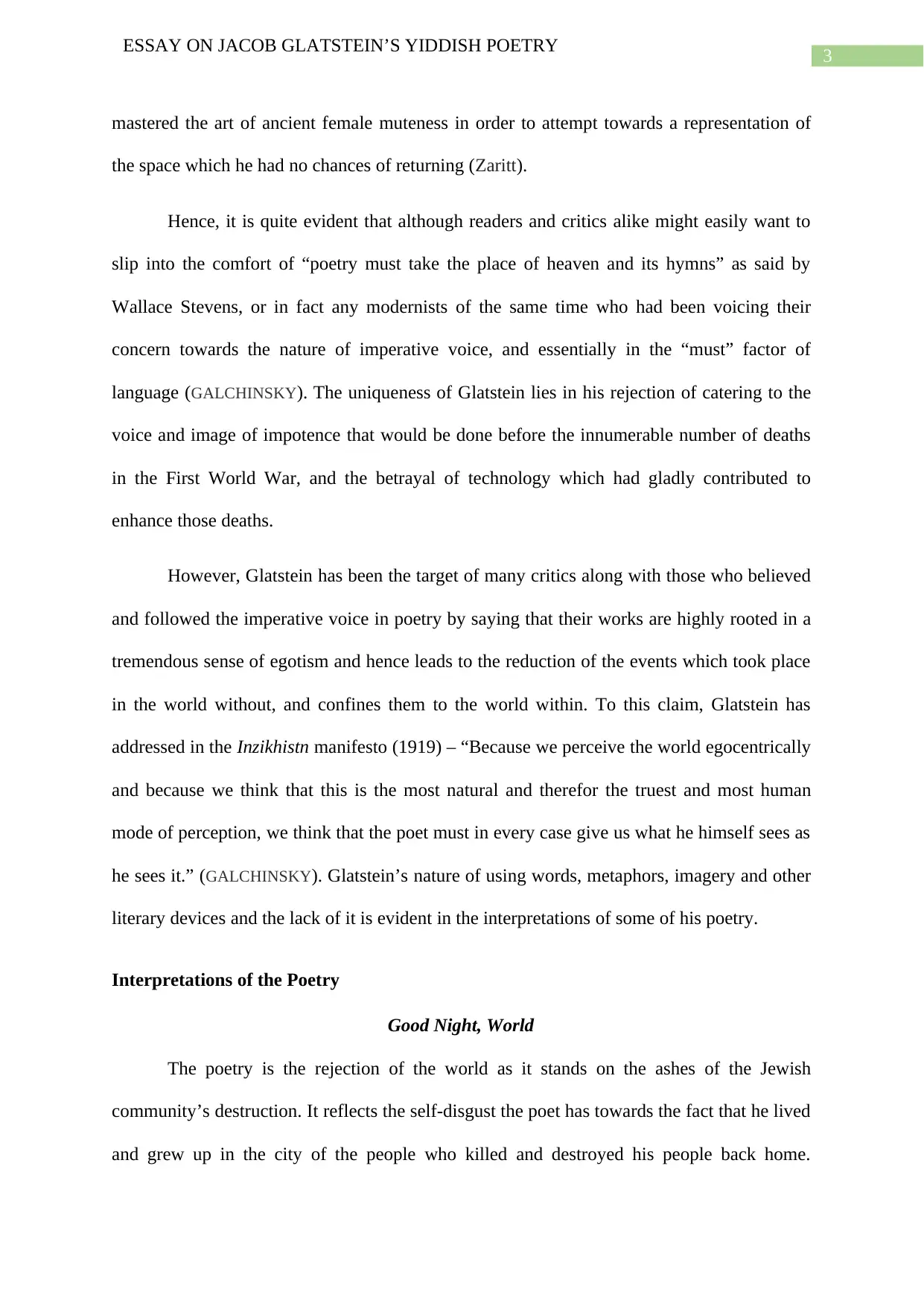
3
ESSAY ON JACOB GLATSTEIN’S YIDDISH POETRY
mastered the art of ancient female muteness in order to attempt towards a representation of
the space which he had no chances of returning (Zaritt).
Hence, it is quite evident that although readers and critics alike might easily want to
slip into the comfort of “poetry must take the place of heaven and its hymns” as said by
Wallace Stevens, or in fact any modernists of the same time who had been voicing their
concern towards the nature of imperative voice, and essentially in the “must” factor of
language (GALCHINSKY). The uniqueness of Glatstein lies in his rejection of catering to the
voice and image of impotence that would be done before the innumerable number of deaths
in the First World War, and the betrayal of technology which had gladly contributed to
enhance those deaths.
However, Glatstein has been the target of many critics along with those who believed
and followed the imperative voice in poetry by saying that their works are highly rooted in a
tremendous sense of egotism and hence leads to the reduction of the events which took place
in the world without, and confines them to the world within. To this claim, Glatstein has
addressed in the Inzikhistn manifesto (1919) – “Because we perceive the world egocentrically
and because we think that this is the most natural and therefor the truest and most human
mode of perception, we think that the poet must in every case give us what he himself sees as
he sees it.” (GALCHINSKY). Glatstein’s nature of using words, metaphors, imagery and other
literary devices and the lack of it is evident in the interpretations of some of his poetry.
Interpretations of the Poetry
Good Night, World
The poetry is the rejection of the world as it stands on the ashes of the Jewish
community’s destruction. It reflects the self-disgust the poet has towards the fact that he lived
and grew up in the city of the people who killed and destroyed his people back home.
ESSAY ON JACOB GLATSTEIN’S YIDDISH POETRY
mastered the art of ancient female muteness in order to attempt towards a representation of
the space which he had no chances of returning (Zaritt).
Hence, it is quite evident that although readers and critics alike might easily want to
slip into the comfort of “poetry must take the place of heaven and its hymns” as said by
Wallace Stevens, or in fact any modernists of the same time who had been voicing their
concern towards the nature of imperative voice, and essentially in the “must” factor of
language (GALCHINSKY). The uniqueness of Glatstein lies in his rejection of catering to the
voice and image of impotence that would be done before the innumerable number of deaths
in the First World War, and the betrayal of technology which had gladly contributed to
enhance those deaths.
However, Glatstein has been the target of many critics along with those who believed
and followed the imperative voice in poetry by saying that their works are highly rooted in a
tremendous sense of egotism and hence leads to the reduction of the events which took place
in the world without, and confines them to the world within. To this claim, Glatstein has
addressed in the Inzikhistn manifesto (1919) – “Because we perceive the world egocentrically
and because we think that this is the most natural and therefor the truest and most human
mode of perception, we think that the poet must in every case give us what he himself sees as
he sees it.” (GALCHINSKY). Glatstein’s nature of using words, metaphors, imagery and other
literary devices and the lack of it is evident in the interpretations of some of his poetry.
Interpretations of the Poetry
Good Night, World
The poetry is the rejection of the world as it stands on the ashes of the Jewish
community’s destruction. It reflects the self-disgust the poet has towards the fact that he lived
and grew up in the city of the people who killed and destroyed his people back home.
Paraphrase This Document
Need a fresh take? Get an instant paraphrase of this document with our AI Paraphraser
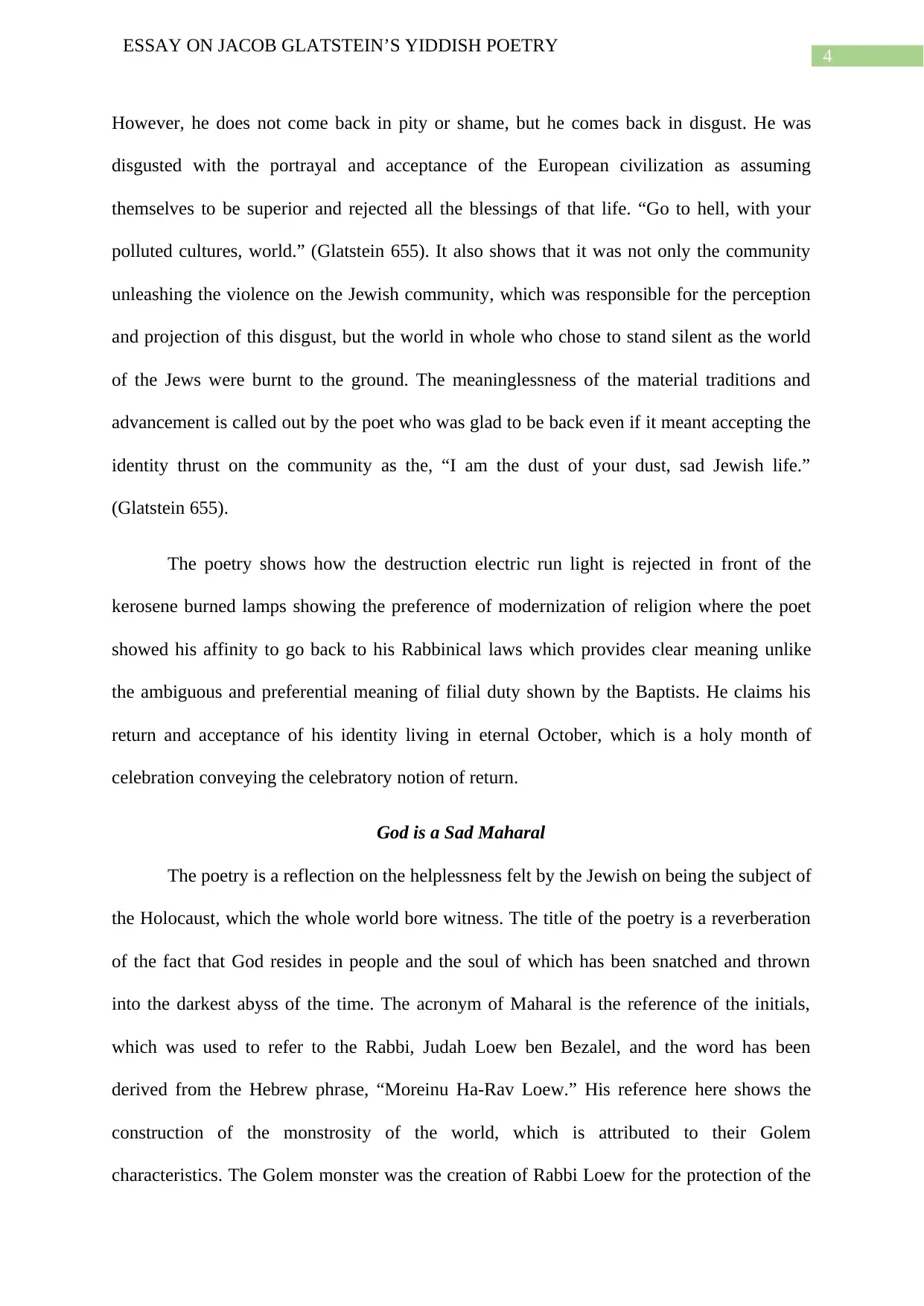
4
ESSAY ON JACOB GLATSTEIN’S YIDDISH POETRY
However, he does not come back in pity or shame, but he comes back in disgust. He was
disgusted with the portrayal and acceptance of the European civilization as assuming
themselves to be superior and rejected all the blessings of that life. “Go to hell, with your
polluted cultures, world.” (Glatstein 655). It also shows that it was not only the community
unleashing the violence on the Jewish community, which was responsible for the perception
and projection of this disgust, but the world in whole who chose to stand silent as the world
of the Jews were burnt to the ground. The meaninglessness of the material traditions and
advancement is called out by the poet who was glad to be back even if it meant accepting the
identity thrust on the community as the, “I am the dust of your dust, sad Jewish life.”
(Glatstein 655).
The poetry shows how the destruction electric run light is rejected in front of the
kerosene burned lamps showing the preference of modernization of religion where the poet
showed his affinity to go back to his Rabbinical laws which provides clear meaning unlike
the ambiguous and preferential meaning of filial duty shown by the Baptists. He claims his
return and acceptance of his identity living in eternal October, which is a holy month of
celebration conveying the celebratory notion of return.
God is a Sad Maharal
The poetry is a reflection on the helplessness felt by the Jewish on being the subject of
the Holocaust, which the whole world bore witness. The title of the poetry is a reverberation
of the fact that God resides in people and the soul of which has been snatched and thrown
into the darkest abyss of the time. The acronym of Maharal is the reference of the initials,
which was used to refer to the Rabbi, Judah Loew ben Bezalel, and the word has been
derived from the Hebrew phrase, “Moreinu Ha-Rav Loew.” His reference here shows the
construction of the monstrosity of the world, which is attributed to their Golem
characteristics. The Golem monster was the creation of Rabbi Loew for the protection of the
ESSAY ON JACOB GLATSTEIN’S YIDDISH POETRY
However, he does not come back in pity or shame, but he comes back in disgust. He was
disgusted with the portrayal and acceptance of the European civilization as assuming
themselves to be superior and rejected all the blessings of that life. “Go to hell, with your
polluted cultures, world.” (Glatstein 655). It also shows that it was not only the community
unleashing the violence on the Jewish community, which was responsible for the perception
and projection of this disgust, but the world in whole who chose to stand silent as the world
of the Jews were burnt to the ground. The meaninglessness of the material traditions and
advancement is called out by the poet who was glad to be back even if it meant accepting the
identity thrust on the community as the, “I am the dust of your dust, sad Jewish life.”
(Glatstein 655).
The poetry shows how the destruction electric run light is rejected in front of the
kerosene burned lamps showing the preference of modernization of religion where the poet
showed his affinity to go back to his Rabbinical laws which provides clear meaning unlike
the ambiguous and preferential meaning of filial duty shown by the Baptists. He claims his
return and acceptance of his identity living in eternal October, which is a holy month of
celebration conveying the celebratory notion of return.
God is a Sad Maharal
The poetry is a reflection on the helplessness felt by the Jewish on being the subject of
the Holocaust, which the whole world bore witness. The title of the poetry is a reverberation
of the fact that God resides in people and the soul of which has been snatched and thrown
into the darkest abyss of the time. The acronym of Maharal is the reference of the initials,
which was used to refer to the Rabbi, Judah Loew ben Bezalel, and the word has been
derived from the Hebrew phrase, “Moreinu Ha-Rav Loew.” His reference here shows the
construction of the monstrosity of the world, which is attributed to their Golem
characteristics. The Golem monster was the creation of Rabbi Loew for the protection of the
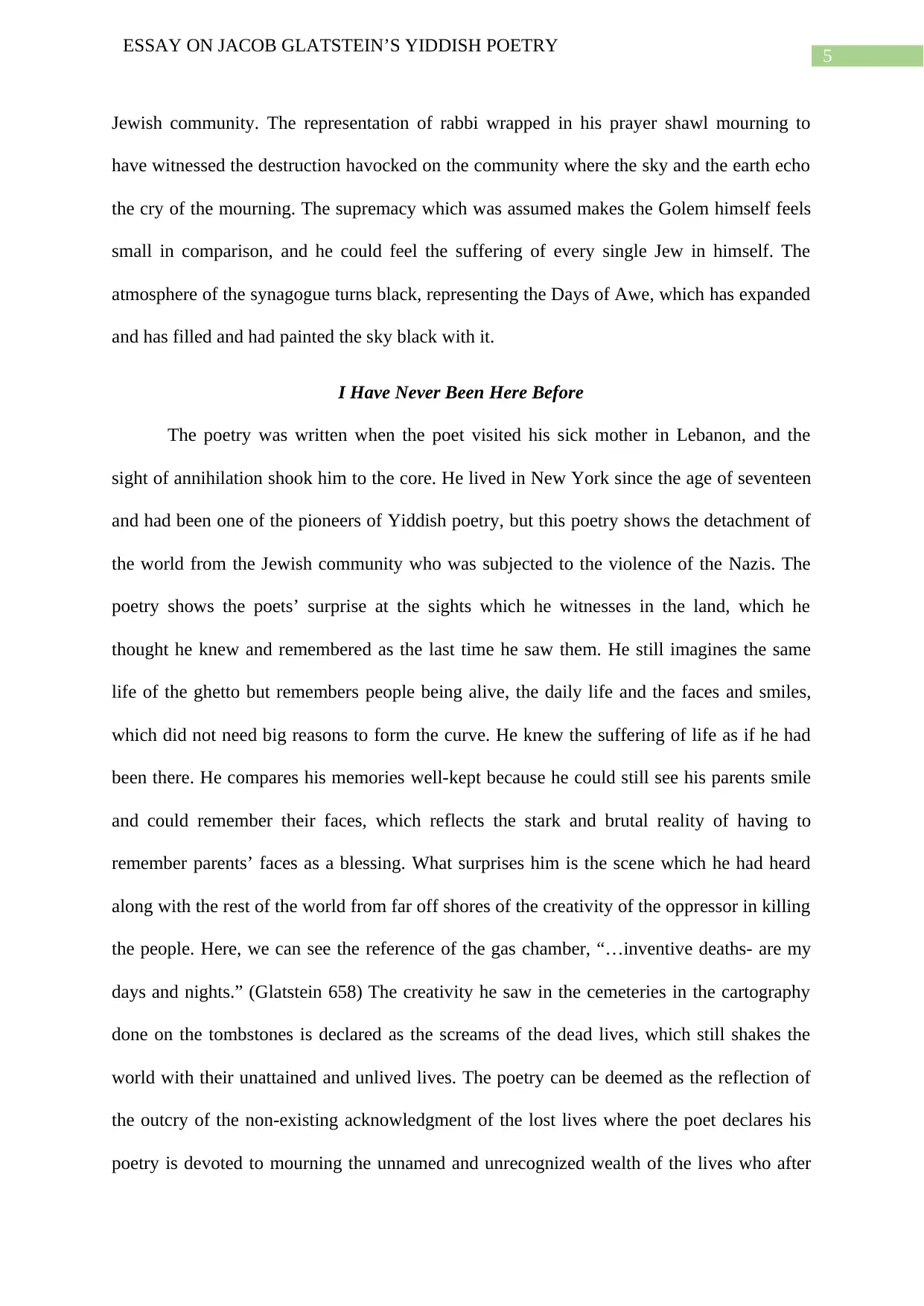
5
ESSAY ON JACOB GLATSTEIN’S YIDDISH POETRY
Jewish community. The representation of rabbi wrapped in his prayer shawl mourning to
have witnessed the destruction havocked on the community where the sky and the earth echo
the cry of the mourning. The supremacy which was assumed makes the Golem himself feels
small in comparison, and he could feel the suffering of every single Jew in himself. The
atmosphere of the synagogue turns black, representing the Days of Awe, which has expanded
and has filled and had painted the sky black with it.
I Have Never Been Here Before
The poetry was written when the poet visited his sick mother in Lebanon, and the
sight of annihilation shook him to the core. He lived in New York since the age of seventeen
and had been one of the pioneers of Yiddish poetry, but this poetry shows the detachment of
the world from the Jewish community who was subjected to the violence of the Nazis. The
poetry shows the poets’ surprise at the sights which he witnesses in the land, which he
thought he knew and remembered as the last time he saw them. He still imagines the same
life of the ghetto but remembers people being alive, the daily life and the faces and smiles,
which did not need big reasons to form the curve. He knew the suffering of life as if he had
been there. He compares his memories well-kept because he could still see his parents smile
and could remember their faces, which reflects the stark and brutal reality of having to
remember parents’ faces as a blessing. What surprises him is the scene which he had heard
along with the rest of the world from far off shores of the creativity of the oppressor in killing
the people. Here, we can see the reference of the gas chamber, “…inventive deaths- are my
days and nights.” (Glatstein 658) The creativity he saw in the cemeteries in the cartography
done on the tombstones is declared as the screams of the dead lives, which still shakes the
world with their unattained and unlived lives. The poetry can be deemed as the reflection of
the outcry of the non-existing acknowledgment of the lost lives where the poet declares his
poetry is devoted to mourning the unnamed and unrecognized wealth of the lives who after
ESSAY ON JACOB GLATSTEIN’S YIDDISH POETRY
Jewish community. The representation of rabbi wrapped in his prayer shawl mourning to
have witnessed the destruction havocked on the community where the sky and the earth echo
the cry of the mourning. The supremacy which was assumed makes the Golem himself feels
small in comparison, and he could feel the suffering of every single Jew in himself. The
atmosphere of the synagogue turns black, representing the Days of Awe, which has expanded
and has filled and had painted the sky black with it.
I Have Never Been Here Before
The poetry was written when the poet visited his sick mother in Lebanon, and the
sight of annihilation shook him to the core. He lived in New York since the age of seventeen
and had been one of the pioneers of Yiddish poetry, but this poetry shows the detachment of
the world from the Jewish community who was subjected to the violence of the Nazis. The
poetry shows the poets’ surprise at the sights which he witnesses in the land, which he
thought he knew and remembered as the last time he saw them. He still imagines the same
life of the ghetto but remembers people being alive, the daily life and the faces and smiles,
which did not need big reasons to form the curve. He knew the suffering of life as if he had
been there. He compares his memories well-kept because he could still see his parents smile
and could remember their faces, which reflects the stark and brutal reality of having to
remember parents’ faces as a blessing. What surprises him is the scene which he had heard
along with the rest of the world from far off shores of the creativity of the oppressor in killing
the people. Here, we can see the reference of the gas chamber, “…inventive deaths- are my
days and nights.” (Glatstein 658) The creativity he saw in the cemeteries in the cartography
done on the tombstones is declared as the screams of the dead lives, which still shakes the
world with their unattained and unlived lives. The poetry can be deemed as the reflection of
the outcry of the non-existing acknowledgment of the lost lives where the poet declares his
poetry is devoted to mourning the unnamed and unrecognized wealth of the lives who after
⊘ This is a preview!⊘
Do you want full access?
Subscribe today to unlock all pages.

Trusted by 1+ million students worldwide
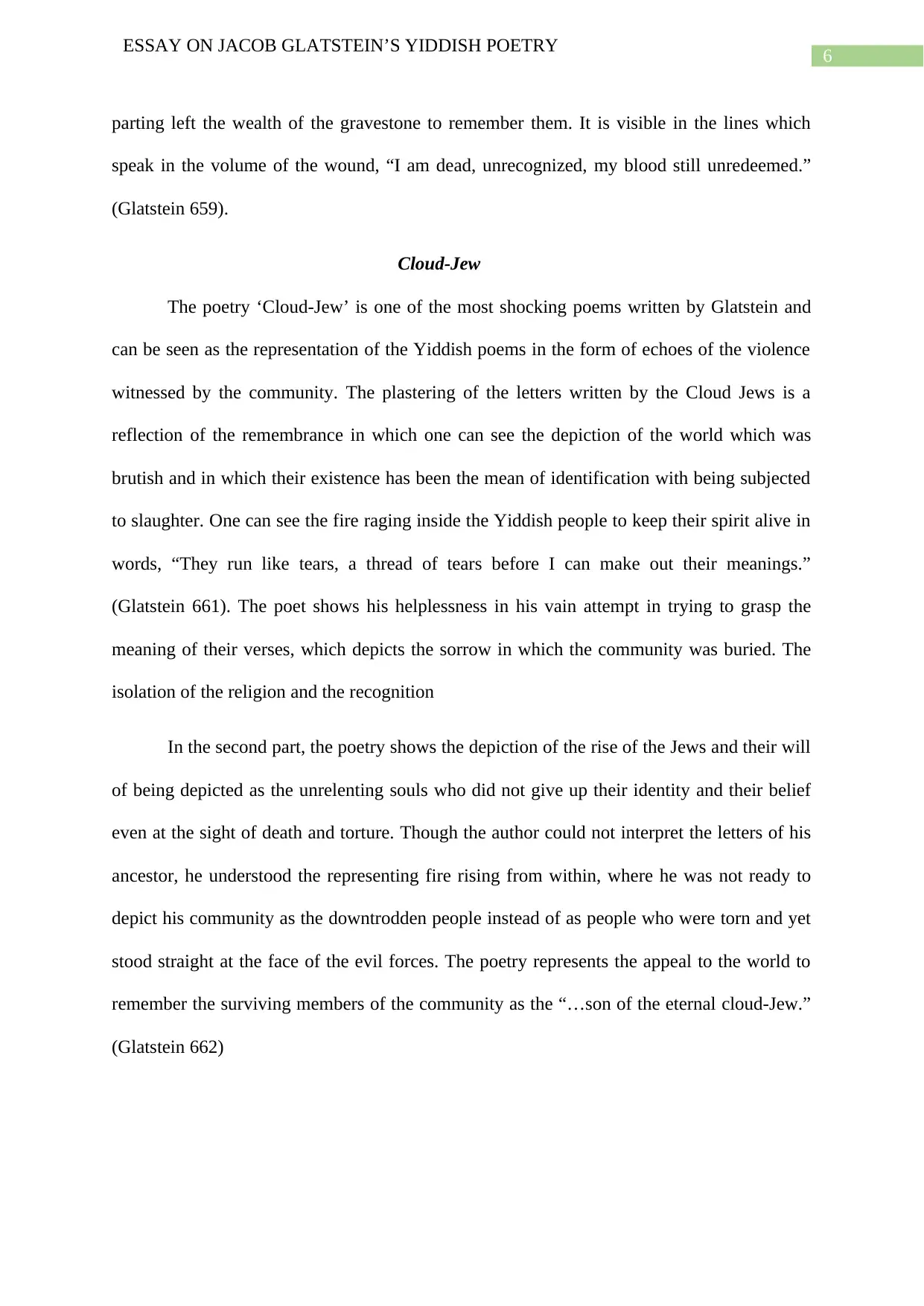
6
ESSAY ON JACOB GLATSTEIN’S YIDDISH POETRY
parting left the wealth of the gravestone to remember them. It is visible in the lines which
speak in the volume of the wound, “I am dead, unrecognized, my blood still unredeemed.”
(Glatstein 659).
Cloud-Jew
The poetry ‘Cloud-Jew’ is one of the most shocking poems written by Glatstein and
can be seen as the representation of the Yiddish poems in the form of echoes of the violence
witnessed by the community. The plastering of the letters written by the Cloud Jews is a
reflection of the remembrance in which one can see the depiction of the world which was
brutish and in which their existence has been the mean of identification with being subjected
to slaughter. One can see the fire raging inside the Yiddish people to keep their spirit alive in
words, “They run like tears, a thread of tears before I can make out their meanings.”
(Glatstein 661). The poet shows his helplessness in his vain attempt in trying to grasp the
meaning of their verses, which depicts the sorrow in which the community was buried. The
isolation of the religion and the recognition
In the second part, the poetry shows the depiction of the rise of the Jews and their will
of being depicted as the unrelenting souls who did not give up their identity and their belief
even at the sight of death and torture. Though the author could not interpret the letters of his
ancestor, he understood the representing fire rising from within, where he was not ready to
depict his community as the downtrodden people instead of as people who were torn and yet
stood straight at the face of the evil forces. The poetry represents the appeal to the world to
remember the surviving members of the community as the “…son of the eternal cloud-Jew.”
(Glatstein 662)
ESSAY ON JACOB GLATSTEIN’S YIDDISH POETRY
parting left the wealth of the gravestone to remember them. It is visible in the lines which
speak in the volume of the wound, “I am dead, unrecognized, my blood still unredeemed.”
(Glatstein 659).
Cloud-Jew
The poetry ‘Cloud-Jew’ is one of the most shocking poems written by Glatstein and
can be seen as the representation of the Yiddish poems in the form of echoes of the violence
witnessed by the community. The plastering of the letters written by the Cloud Jews is a
reflection of the remembrance in which one can see the depiction of the world which was
brutish and in which their existence has been the mean of identification with being subjected
to slaughter. One can see the fire raging inside the Yiddish people to keep their spirit alive in
words, “They run like tears, a thread of tears before I can make out their meanings.”
(Glatstein 661). The poet shows his helplessness in his vain attempt in trying to grasp the
meaning of their verses, which depicts the sorrow in which the community was buried. The
isolation of the religion and the recognition
In the second part, the poetry shows the depiction of the rise of the Jews and their will
of being depicted as the unrelenting souls who did not give up their identity and their belief
even at the sight of death and torture. Though the author could not interpret the letters of his
ancestor, he understood the representing fire rising from within, where he was not ready to
depict his community as the downtrodden people instead of as people who were torn and yet
stood straight at the face of the evil forces. The poetry represents the appeal to the world to
remember the surviving members of the community as the “…son of the eternal cloud-Jew.”
(Glatstein 662)
Paraphrase This Document
Need a fresh take? Get an instant paraphrase of this document with our AI Paraphraser
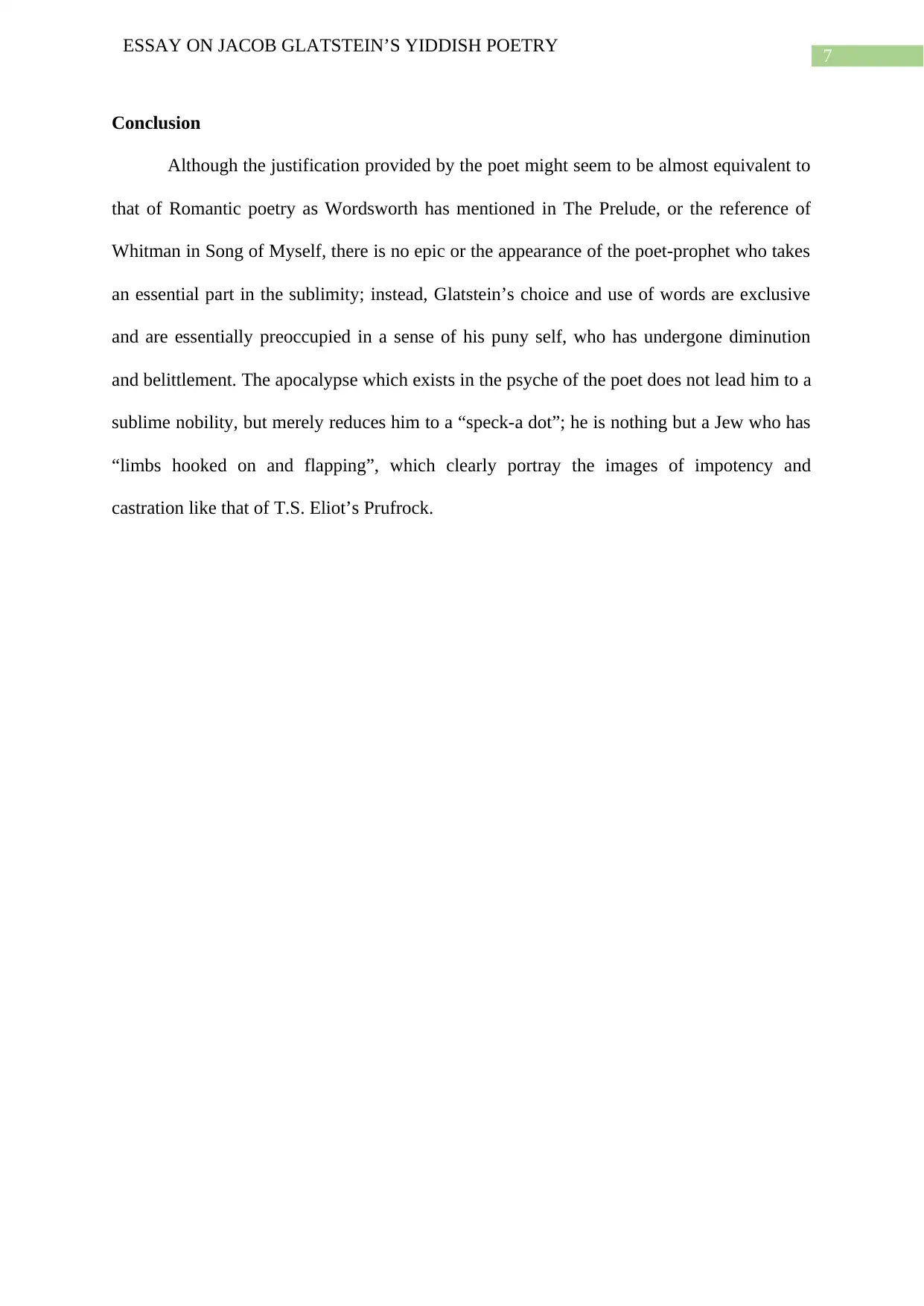
7
ESSAY ON JACOB GLATSTEIN’S YIDDISH POETRY
Conclusion
Although the justification provided by the poet might seem to be almost equivalent to
that of Romantic poetry as Wordsworth has mentioned in The Prelude, or the reference of
Whitman in Song of Myself, there is no epic or the appearance of the poet-prophet who takes
an essential part in the sublimity; instead, Glatstein’s choice and use of words are exclusive
and are essentially preoccupied in a sense of his puny self, who has undergone diminution
and belittlement. The apocalypse which exists in the psyche of the poet does not lead him to a
sublime nobility, but merely reduces him to a “speck-a dot”; he is nothing but a Jew who has
“limbs hooked on and flapping”, which clearly portray the images of impotency and
castration like that of T.S. Eliot’s Prufrock.
ESSAY ON JACOB GLATSTEIN’S YIDDISH POETRY
Conclusion
Although the justification provided by the poet might seem to be almost equivalent to
that of Romantic poetry as Wordsworth has mentioned in The Prelude, or the reference of
Whitman in Song of Myself, there is no epic or the appearance of the poet-prophet who takes
an essential part in the sublimity; instead, Glatstein’s choice and use of words are exclusive
and are essentially preoccupied in a sense of his puny self, who has undergone diminution
and belittlement. The apocalypse which exists in the psyche of the poet does not lead him to a
sublime nobility, but merely reduces him to a “speck-a dot”; he is nothing but a Jew who has
“limbs hooked on and flapping”, which clearly portray the images of impotency and
castration like that of T.S. Eliot’s Prufrock.
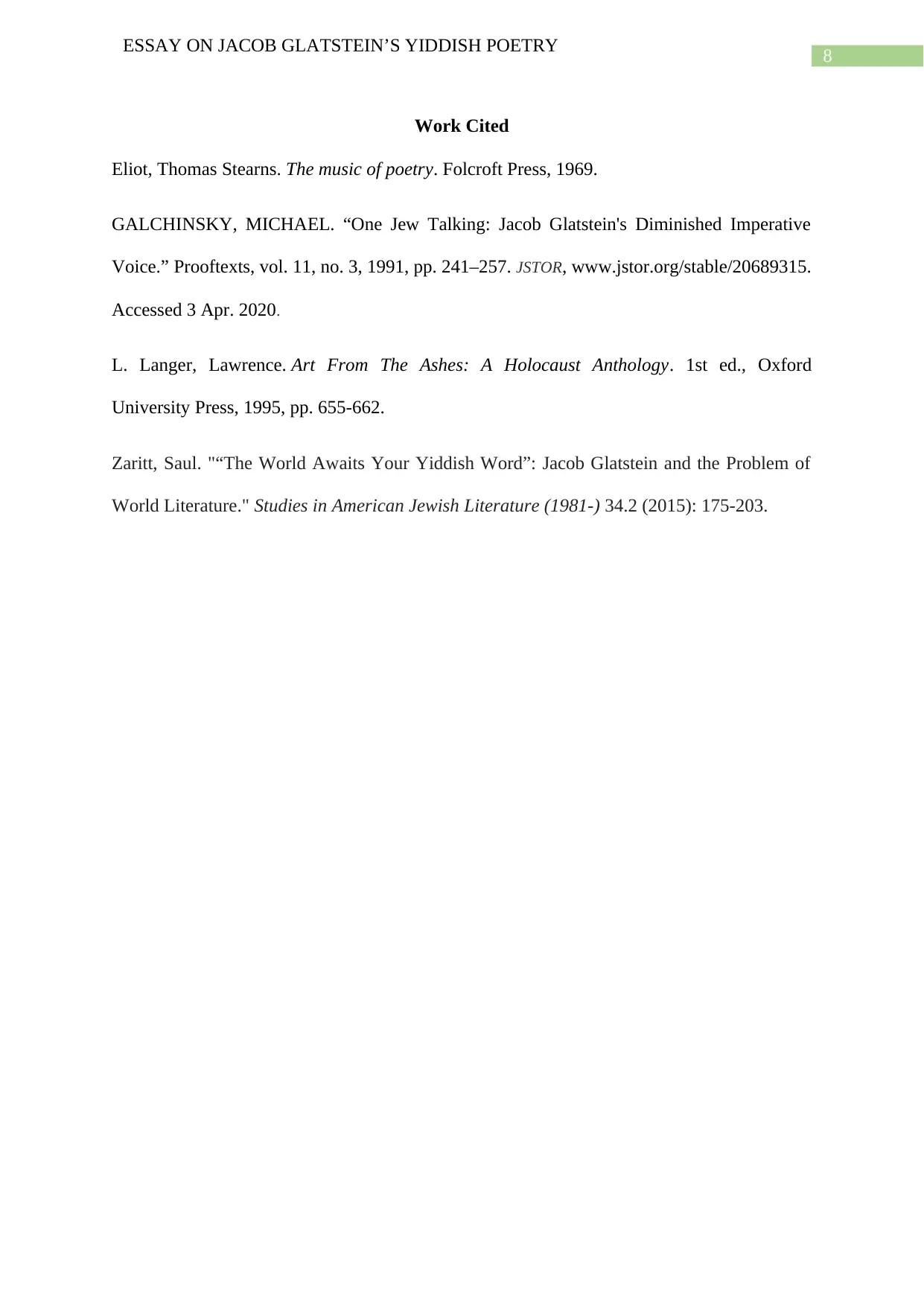
8
ESSAY ON JACOB GLATSTEIN’S YIDDISH POETRY
Work Cited
Eliot, Thomas Stearns. The music of poetry. Folcroft Press, 1969.
GALCHINSKY, MICHAEL. “One Jew Talking: Jacob Glatstein's Diminished Imperative
Voice.” Prooftexts, vol. 11, no. 3, 1991, pp. 241–257. JSTOR, www.jstor.org/stable/20689315.
Accessed 3 Apr. 2020.
L. Langer, Lawrence. Art From The Ashes: A Holocaust Anthology. 1st ed., Oxford
University Press, 1995, pp. 655-662.
Zaritt, Saul. "“The World Awaits Your Yiddish Word”: Jacob Glatstein and the Problem of
World Literature." Studies in American Jewish Literature (1981-) 34.2 (2015): 175-203.
ESSAY ON JACOB GLATSTEIN’S YIDDISH POETRY
Work Cited
Eliot, Thomas Stearns. The music of poetry. Folcroft Press, 1969.
GALCHINSKY, MICHAEL. “One Jew Talking: Jacob Glatstein's Diminished Imperative
Voice.” Prooftexts, vol. 11, no. 3, 1991, pp. 241–257. JSTOR, www.jstor.org/stable/20689315.
Accessed 3 Apr. 2020.
L. Langer, Lawrence. Art From The Ashes: A Holocaust Anthology. 1st ed., Oxford
University Press, 1995, pp. 655-662.
Zaritt, Saul. "“The World Awaits Your Yiddish Word”: Jacob Glatstein and the Problem of
World Literature." Studies in American Jewish Literature (1981-) 34.2 (2015): 175-203.
⊘ This is a preview!⊘
Do you want full access?
Subscribe today to unlock all pages.

Trusted by 1+ million students worldwide
1 out of 9
Related Documents
Your All-in-One AI-Powered Toolkit for Academic Success.
+13062052269
info@desklib.com
Available 24*7 on WhatsApp / Email
![[object Object]](/_next/static/media/star-bottom.7253800d.svg)
Unlock your academic potential
Copyright © 2020–2025 A2Z Services. All Rights Reserved. Developed and managed by ZUCOL.





